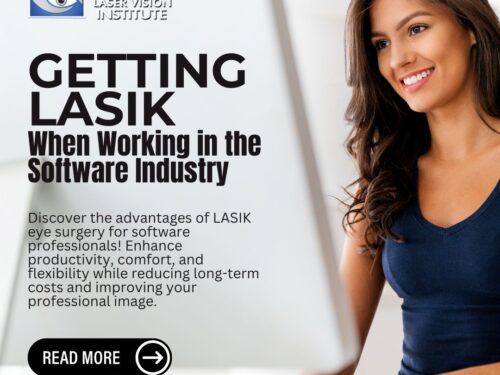
If you feel that everything you look at has a cloudy effect, it probably isn’t the weather doing that. A Refractive and LASIK surgeon in Orange County like Dr. Moosa tells us that it could be that you are developing cataracts. This is an eye condition that involves the lens in one of your eyes or both of your eyes, has become partly or completely cloudy.

The eyes’ lens plays an important role in helping us see acutely. When a person looks at something, light passes through the clear cover or cornea, which bends it and transmit it inside the eye to the lens. Then, the lens focuses the light onto the retina, which performs very similar to the film in a camera, inside the eye. Afterward, the retina delivers the information to the brain.
According to the refractive and LASIK Orange County surgeon, there is going to be a time in a person’s life that our lenses will begin to change and go from clear to cloudy. This will stop the retina from receiving a sharp image, and the image that the person affected will be a blurry one.
If this happens to you, you might be asking yourself if you are developing cataracts, and you might have some questions about what you can do. Here are a few answers to questions you probably want to know about concerning this eye condition.
How Do You Know You Have Cataracts?
As mentioned before, patients that visit the refractive and LASIK surgeon in Orange County that have a clouding of a normally clear lens of the eye, have a cataract. When a person has cataracts, trying to see through a cloudy lens, is kind of like looking through a frosty or fogged-up window. When you are experiencing cloudy vision caused by cataracts you may find that you have a difficult time reading, driving a car (particularly at night) or see the expression on people’s faces.
A lot of times, cataracts develop gradually and does not disturb a person’s eyesight within its early stages. However, over time cataracts will ultimately obstruct your vision.
Initially, more powerful lighting and eyeglasses can help anyone deal with cataracts. Although, if the impaired vision interferes with a person’s usual activities, an eye surgeon may recommend surgery. Fortunately, cataract surgery by the refractrive and LASIK surgeon in Orange County is a safe and effective procedure.
When a person reaches the age of 60 and over, they may realize that their vision is getting cloudy, fuzzy and colors look faded. This may mean you have cataracts. Some people begin to experience these symptoms as early as in their 40s or 50s.
Other transformations in vision to look out for are reduced night vision, halos around lights and double vision. Experiencing cataracts is part of the normal aging process, even though it can happen at any stage in life. Also, it is a very common eye condition for people who are suffering from diabetes, an eye injury, or use steroid eye drops or tablets. Individuals who smoke, consume alcohol or have a poor diet are also at a very high risk of developing cataracts. If you see any changes in your vision or #belive you have cataracts, book an appointment with your ophthalmologist immediately.
What Tests Will My Ophthalmologist Give Me?
Besides giving you a complete eye exam, your ophthalmologist will do the following:
- Give you a visual acuity test, which is reading an eye chart, to assess your distance and near vision and ss if you just need a change of glasses.
- Examine the front of your eyes, together with your lens, using a specific microscope called a slit lamp.
- Your eye doctor will dilate your eyes using special drops to open your pupils to examine the inside of your eyes, including the lens (cataract), retina and optic nerve.
Do I Need Surgery?
You could be lucky and your cataracts could stay small and may not have to be removed. However, if they begin to interfere with your everyday activities, then you may want to think about getting surgery.
Cataract surgery is usually an outpatient operation. During the procedure, your cataract surgeon (also called a refractive surgeon) will remove the cloudy lens and replace it with an artificial intraocular lens (IOL)implant. Ordinarily, cataract surgery is very effective and there is a new type of cataract surgery that may be a good alternative to discuss with your eye surgeon.
What IOL Lens Options Are Available?
There are many several types of IOL technology available, including standard or mono-focal lenses, which can correct vision at one range of distance (near, far or intermediate). The most recent multifocal or accommodating intraocular lenses can help you see both near and far objects with a reduced or even total reduction in the requirement for glasses.
Toric intraocular lenses correct astigmatism and distance vision, but you may require glasses for reading. Similar to LASIK, there is an IOL monovision option, which utilizes two different lenses to correct near vision in one eye and distance vision in the other.
What Can I Do To Delay Cataracts?
If you are afraid of getting cataracts or it runs in the family, there are various simple lifestyle choices you can make that could help you delay getting cataracts. For instance, wear sunglasses with UV protection and a hat, don’t smoke, eat a healthy diet that consists of lots of fruit and vegetables since they are high in protective antioxidants such as Vitamin C, A and E. Additionally, you should never skip out on your regular visits to your eye doctor since it is crucial for your general and vision health.
Does It Matter If I Had Eye Surgery In The Past?
Normally, no. As a matter of fact, cataract surgery can be performed after most laser vision correction procedures such as LASIK, PRK, and SMILE. This is because LASIK and other laser vision correction techniques are done on the cornea which is the front surface of the eye. Whereas cataract surgery changes the lens of the eye which sits behind the pupil. The eye’s cornea and lens are needed to help your eye focus, but they have different structures.
That being said, it is important to let your cataract surgeon know you have had previous eye surgery. Also, it is helpful if you find an experienced and well-trained eye refractive surgeon such as Dr. Ferzaad Moosa to give you the advice and care that you need. If you have more questions about cataracts, give Excel Laser Vision Institute a call at + (818) 907-8606 to arrange an appointment today.



